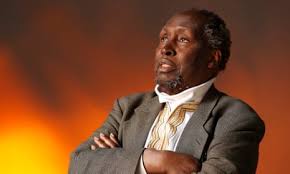Ngũgĩ wa Thiong’o, the celebrated Kenyan writer, academic, and champion of African languages, has died at the age of 87. Widely regarded as one of the most influential literary figures on the continent, his career spanned more than six decades.
Despite battling prostate cancer, undergoing triple heart bypass surgery, and living with kidney failure, Ngũgĩ’s resilience stood as a mirror to the struggles of the people he wrote about.
His works were a cornerstone in literature syllabi across universities like Makerere University, Kyambogo University, Gulu University, and several teacher training colleges, shaping how generations of Ugandan students understood African identity, decolonization, and the power of language.
In O-Level and A-Level Literature classes, particularly in African Literature modules, Ngũgĩ’s early novels were often studied alongside Chinua Achebe and Okot p’Bitek. In his character portrayals, themes of betrayal, land alienation, resistance, and the cost of independence resonated deeply with Uganda’s own post-colonial struggles.
In universities, Ngũgĩ’s bold rejection of the English language in favor of Gikuyu in later works like Devil on the Cross and his essays in Decolonising the Mind pushed critical discussions around: The role of language in education, value of indigenous languages and the psychological impact of colonialism.
His Works in the Curriculum in books like: Weep Not, Child, The River Between, A Grain of Wheat, Petals of Blood and Devil on the Cross were not just taught for their literary merit , they were analyzed for their political depth, sociological commentary, and linguistic significance.
Ngũgĩ inspired students to think beyond literature as art , to view it as a weapon of resistance, a tool of liberation, and a means of reclaiming African identity. His essay On the Abolition of the English Department was widely debated in literature and education faculties across Uganda. Many student-led seminars questioned: Why most Ugandan literature syllabi centered European writers, Why Luganda, Ateso, Runyankole, and other languages were excluded from higher literary discourse.
Some literature students, especially at Kyambogo’s Department of Language and Communication, adopted his principles to argue for the inclusion of oral literature and indigenous texts in formal academic spaces.
Ngũgĩ’s emphasis on cultural pride, resistance to neo-colonialism, and the valorization of African worldviews influenced not just what was taught, but how it was taught.
He made Ugandan lecturers and education policymakers rethink the need for Afro-centric reading lists. In turn, this helped boost Ugandan literary scholarship and encouraged a generation of writers and educators to embrace and teach Ugandan-authored texts like those of Austin Bukenya, Okello Oculi, and Mary Karooro Okurut with equal reverence.
In the classroom, Ngũgĩ’s legacy was simple but powerful: literature is not neutral. It can oppress, or it can free.
Born in 1938 under British colonial rule, Ngũgĩ , originally named James Thiong’o Ngũgĩ chronicled Kenya’s turbulent transformation from colony to independence. His novels, plays, essays, and speeches consistently examined themes of injustice, colonial oppression, language politics, and post-independence betrayal.
Ngũgĩ wa Thiong’o (1938–2025) stands as a monumental figure in African literature, whose works and advocacy have profoundly influenced postcolonial thought and literary studies.
Ngũgĩ’s debut novel, Weep Not, Child (1964), was the first major English-language novel by an East African author. This was followed by The River Between (1965) and A Grain of Wheat (1967), which delved into Kenya’s struggle for independence and the complexities of colonial and postcolonial identities.
His debut novel Weep Not, Child (1964) was the first major English-language novel published by an East African author.
In 1977, Ngũgĩ made a defining turn in his life and career. He dropped his colonial name and committed to writing exclusively in his native language, Kikuyu. That same year, his scathing novel Petals of Blood and his co-written play Ngaahika Ndeenda (I Will Marry When I Want) drew the ire of the Kenyan government. The play was banned and Ngũgĩ was imprisoned without trial in a maximum-security facility for a year.
During his incarceration, he authored Devil on the Cross, his first Kikuyu-language novel, reportedly written on prison-issued toilet paper.
Following his release, threats to his life forced him into self-imposed exile, first in the UK and then in the United States. He did not return to Kenya for 22 years. Upon his return, he was attacked in his home, and his wife was assaulted an act Ngũgĩ described as politically motivated.
Ngũgĩ held academic posts at some of the world’s leading universities, including Yale, New York University, and the University of California, Irvine. He became a global voice for linguistic decolonisation, famously arguing that African writers must not rely on colonial languages to tell African stories.
His powerful essay collection Decolonising the Mind remains a foundational text in post-colonial studies. Yet, his sharp critique even extended to fellow African authors including Chinua Achebe , whom he accused of reinforcing colonial dominance by writing in English.
Beyond his literary works, Ngũgĩ was a respected academic, holding positions at institutions such as the University of Nairobi, Northwestern University, and the University of California, Irvine. He was instrumental in reshaping literature curricula to center African literature and perspectives.
Throughout his career, Ngũgĩ received numerous accolades, including honorary doctorates and international literary awards. His works have been translated into multiple languages, and he remained a perennial candidate for the Nobel Prize in Literature.
Ngũgĩ’s personal life was complex. Married and divorced twice, he was the father of nine children, several of whom became authors in their own right. His son, Mukoma wa Ngũgĩ, has publicly accused him of domestic abuse towards his mother, claims to which Ngũgĩ did not respond.
Ngũgĩ wa Thiong’o’s legacy endures through his profound contributions to literature, his unwavering advocacy for linguistic and cultural decolonization, and his role in shaping academic discourse on African literature.




